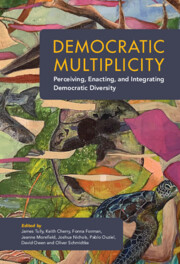
-
Select format
-
- Publisher:
- Cambridge University Press
- Publication date:
- July 2022
- August 2022
- ISBN:
- 9781009178372
- 9781009178389
- 9781009178365
- Creative Commons:
-
This content is Open Access and distributed under the terms of the Creative Commons Attribution licence CC-BY-NC-ND 4.0.
https://creativecommons.org/creativelicenses - Dimensions:
- (229 x 152 mm)
- Weight & Pages:
- 0.82kg, 458 Pages
- Dimensions:
- (229 x 152 mm)
- Weight & Pages:
- 0.7kg, 458 Pages
Open AccessYou have access to this book
Book description
This edited volume argues that democracy is broader and more diverse than the dominant state-centered, modern representative democracies, to which other modes of democracy are either presumed subordinate or ignored. The contributors seek to overcome the standard opposition of democracy from below (participatory) and democracy from above (representative). Rather, they argue that through differently situated participatory and representative practices, citizens and governments can develop democratic ways of cooperating without hegemony and subordination, and that these relationships can be transformative. This work proposes a slow but sure, nonviolent, eco-social and sustainable process of democratic generation and growth with the capacity to critique and transform unjust and ecologically destructive social systems. This volume integrates human-centric democracies into a more mutual, interdependent and sustainable system on earth whereby everyone gains.
Contents
Full book PDF-
Democratic Multiplicity
pp i-ii -
-
- You have access
- Open access
- HTML
- Export citation
-
-
Democratic Multiplicity - Title page
pp iii-iii - Perceiving, Enacting, and Integrating Democratic Diversity
-
-
- You have access
- Open access
- HTML
- Export citation
-
-
Copyright page
pp iv-iv -
-
- You have access
- Open access
- HTML
- Export citation
-
-
Contents
pp v-vii -
-
- You have access
- Open access
- HTML
- Export citation
-
-
Figures
pp viii-viii -
-
- You have access
- Open access
- HTML
- Export citation
-
-
Tables
pp ix-ix -
-
- You have access
- Open access
- HTML
- Export citation
-
-
Contributors
pp x-xvi -
-
- You have access
- Open access
- HTML
- Export citation
-
-
Foreword: Democratic Self-and-Other-Determination and the More-than-Human World
pp xvii-xx -
-
-
- You have access
- Open access
- HTML
- Export citation
-
-
Acknowledgments
pp xxi-xxii -
-
- You have access
- Open access
- HTML
- Export citation
-
-
Introduction - The Pluriverse of Democracies
pp 1-22 -
-
-
- You have access
- Open access
- HTML
- Export citation
-
-
Part I - Democratic Ethos
pp 23-62 -
-
- You have access
- Open access
- HTML
- Export citation
-
-
1 - How Democracy Doesn’t End
pp 25-39 -
-
-
- You have access
- Open access
- HTML
- Export citation
-
-
2 - Democracy, Boundaries, and Respect
pp 40-51 -
-
-
- You have access
- Open access
- HTML
- Export citation
-
-
3 - Democracy in a Provisional Key
pp 52-62 -
-
-
- You have access
- Open access
- HTML
- Export citation
-
-
Part II - Representative Democracies
pp 63-124 -
-
- You have access
- Open access
- HTML
- Export citation
-
-
4 - Democracy and Community: Exploring a Contested Link in Light of the Populist Resurgence
pp 65-81 -
-
-
- You have access
- Open access
- HTML
- Export citation
-
-
5 - Democracies Can Perish Democratically Too: Brazilian Democracy on Edge
pp 82-92 -
-
-
- You have access
- Open access
- HTML
- Export citation
-
-
6 - Agonistic Representative Democracy in Europe
pp 93-109 -
-
-
- You have access
- Open access
- HTML
- Export citation
-
-
7 - For a Politics of Exile
pp 110-124 - Criticism in an Era of Global Liberal Decline
-
-
-
- You have access
- Open access
- HTML
- Export citation
-
-
Part III - Local/Global Participatory Democracies
pp 125-192 -
-
- You have access
- Open access
- HTML
- Export citation
-
-
8 - Unwalling Citizenship
pp 127-151 -
-
-
- You have access
- Open access
- HTML
- Export citation
-
-
9 - Other Wise Democracies: What the Tree Canopies Know
pp 152-171 -
-
-
- You have access
- Open access
- HTML
- Export citation
-
-
10 - Democratizing Revolution
pp 172-192 - Self-Reflexivity and Self-Limitation Beyond Liberalism
-
-
-
- You have access
- Open access
- HTML
- Export citation
-
-
Part IV - Indigenous Democracies
pp 193-304 -
-
- You have access
- Open access
- HTML
- Export citation
-
-
11 - Gitxsan Democracy: On Its Own Terms
pp 195-213 -
-
-
- You have access
- Open access
- HTML
- Export citation
-
-
Part V - International/Global Democracies
pp 305-346 -
-
- You have access
- Open access
- HTML
- Export citation
-
Metrics
Altmetric attention score
Full text views
Full text views help Loading metrics...
Loading metrics...
* Views captured on Cambridge Core between #date#. This data will be updated every 24 hours.
Usage data cannot currently be displayed.
Accessibility standard: Unknown
Why this information is here
This section outlines the accessibility features of this content - including support for screen readers, full keyboard navigation and high-contrast display options. This may not be relevant for you.
Accessibility Information
Accessibility compliance for the PDF of this book is currently unknown and may be updated in the future.


